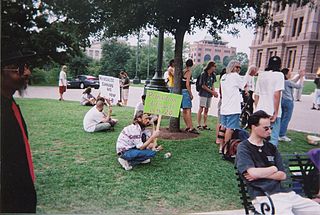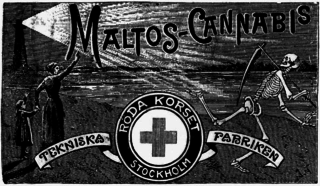
Cannabis in Slovenia is illegal but decriminalized. While medical marijuana is not allowed, the use of certain cannabinoid drugs is permitted.

Cannabis in Slovenia is illegal but decriminalized. While medical marijuana is not allowed, the use of certain cannabinoid drugs is permitted.
In 2012, a proposal was drafted to decriminalize medical cannabis, [1] but it failed to obtain the necessary support. A new proposal was drafted in 2013, [2] which succeeded in gaining enough public support. As a result, the Slovenian government re-classified cannabinoids as Class II illegal drugs (from the original Class I), thus allowing for the medical use of cannabinoid drugs but not medical marijuana. [3] [4]
The possession of any drug for personal use in small quantities is not registered as a criminal act in Slovenia, but it is instead a misdemeanor punishable by a fine of €36 to €179. It is in this sense that it is considered "decriminalized". This can be reduced further if the offender agrees to undergo treatment. This policy is similar to the one in force in Portugal. [5]

Medical cannabis, or medical marijuana (MMJ), is cannabis and cannabinoids that are prescribed by physicians for their patients. The use of cannabis as medicine has not been rigorously tested due to production and governmental restrictions, resulting in limited clinical research to define the safety and efficacy of using cannabis to treat diseases.

In the United States, the removal of cannabis from Schedule I of the Controlled Substances Act, the category reserved for drugs that have "no currently accepted medical use", is a proposed legal and administrative change in cannabis-related law at the federal level. After being proposed repeatedly since 1972, in 2024, the US Department of Justice announced it was initiating rulemaking to reschedule cannabis to Schedule III of the Controlled Substances Act.

Cannabis, also known as marijuana or weed among other names, is a psychoactive drug from the cannabis plant. Native to Central or South Asia, the cannabis plant has been used as a drug for both recreational and entheogenic purposes and in various traditional medicines for centuries. Tetrahydrocannabinol (THC) is the main psychoactive component of cannabis, which is one of the 483 known compounds in the plant, including at least 65 other cannabinoids, such as cannabidiol (CBD). Cannabis can be used by smoking, vaporizing, within food, or as an extract.

In the United States, the non-medical use of cannabis is legalized in 24 states and decriminalized in 7 states, as of November 2023. Decriminalization refers to a policy of reduced penalties for cannabis offenses, typically involving a civil penalty for possessing small amounts, instead of criminal prosecution or the threat of arrest. In jurisdictions without penalty the policy is referred to as legalization, although the term decriminalization is sometimes used for this purpose as well.

In the United States, increased restrictions and labeling of cannabis as a poison began in many states from 1906 onward, and outright prohibitions began in the 1920s. By the mid-1930s cannabis was regulated as a drug in every state, including 35 states that adopted the Uniform State Narcotic Drug Act. The first national regulation was the Marihuana Tax Act of 1937.

Drug liberalization is a drug policy process of decriminalizing, legalizing, or repealing laws that prohibit the production, possession, sale, or use of prohibited drugs. Variations of drug liberalization include drug legalization, drug relegalization, and drug decriminalization. Proponents of drug liberalization may favor a regulatory regime for the production, marketing, and distribution of some or all currently illegal drugs in a manner analogous to that for alcohol, caffeine and tobacco.

The use, sale, and possession of cannabis containing over 0.3% THC by dry weight in the United States, despite laws in many states permitting it under various circumstances, is illegal under federal law. As a Schedule I drug under the federal Controlled Substances Act (CSA) of 1970, cannabis containing over 0.3% THC by dry weight is considered to have "no accepted medical use" and a high potential for abuse and physical or psychological dependence. Cannabis use is illegal for any reason, with the exception of FDA-approved research programs. However, individual states have enacted legislation permitting exemptions for various uses, including medical, industrial, and recreational use.

In the United States, cannabis is legal in 38 of 50 states for medical use and 24 states for recreational use. At the federal level, cannabis is classified as a Schedule I drug under the Controlled Substances Act, determined to have a high potential for abuse and no accepted medical use, prohibiting its use for any purpose. Despite this prohibition, federal law is generally not enforced against the possession, cultivation, or intrastate distribution of cannabis in states where such activity has been legalized. On May 1, 2024, the Associated Press reported on plans by the Drug Enforcement Administration to move marijuana to the less-restrictive Schedule III.

The legal history of cannabis in the United States began with state-level prohibition in the early 20th century, with the first major federal limitations occurring in 1937. Starting with Oregon in 1973, individual states began to liberalize cannabis laws through decriminalization. In 1996, California became the first state to legalize medical cannabis, sparking a trend that spread to a majority of states by 2016. In 2012, Washington and Colorado became the first states to legalize cannabis for recreational use.

Cannabis in Georgia is illegal for recreational use, but decriminalized in the cities of Atlanta, Savannah, Macon, Athens, and others. Limited medical use is allowed in the form of cannabis oil containing less than 5% THC.

Cannabis in Iowa is illegal for recreational use if classified as marijuana but consumable hemp products including CBD products are legal for consumers to possess and registered retailers to sell. Possession of even small amounts of marijuana is a misdemeanor crime. The state has a medical program for patients with qualifying debilitating medical conditions that allows for the legal sale and possession of no more than 4.5g of THC per patient every 90-day period. Allowed modes of consumption are oral & topical forms including, but not limited to; tablets and tinctures, nebulizable inhalable forms, suppositories, and vaporization.

Cannabis in Texas is illegal for recreational use. Possession of up to two ounces is a class B misdemeanor, punishable by up to 180 days in prison and a fine of up to $2000. Several of the state's major municipalities have enacted reforms to apply lesser penalties or limit enforcement, however.

Cannabis in Pennsylvania is illegal for recreational use, but possession of small amounts is decriminalized in several of the state's largest cities. Medical use was legalized in 2016 through a bill passed by the state legislature.

Cannabis in New Mexico is legal for recreational use as of June 29, 2021. A bill to legalize recreational use – House Bill 2, the Cannabis Regulation Act – was signed by Governor Michelle Lujan Grisham on April 12, 2021. The first licensed sales of recreational cannabis began on April 1, 2022.

Cannabis in Ohio is legal for recreational use. Issue 2, a ballot measure to legalize recreational use, passed by a 57–43 margin on November 7, 2023. Possession and personal cultivation of cannabis became legal on December 7, 2023, with the first licensed sales yet to occur under the law. Prior to legalization, Ohio decriminalized possession of up 100 grams in 1975, with several of the state's major cities later enacting further reforms.

Cannabis in Sweden is illegal for all purposes. It is illegal for recreational purposes, for most medical purposes and possession of even small amounts of cannabis is a criminal offence. Consequently, limited medical usage of cannabis-based drugs is only allowed for specific conditions.

The possession, use, and distribution of cannabis without a license in the State of Israel are violations under the Dangerous Drugs Ordinance. A decade ago, despite these regulations, enforcement was relatively lax, partially influenced by a political movement advocating tolerance. Over the years, the enforcement approach has progressively become more lenient. As of 2021, cannabis use has been fully decriminalized, with it being treated as an administrative infraction primarily when used in highly visible public places. There is a possibility that cannabis may be legalized for recreational use by adults aged 21 and older in the future, with regulations akin to those for alcohol. Public and cross-party political support for the complete decriminalization of cannabis increased in the 2010s with increasing usage for both medical and recreational purposes, and the establishment of a political party primarily devoted to this cause; on July 19, 2018, the Knesset approved a bill for decriminalization, although the supporters of recreational cannabis use insisted that this did not represent complete decriminalization. The law came into effect on April 1, 2019. On June 25, 2020, further legislation designed to decriminalize possession of up to 50 grams of cannabis began its passage through the Knesset.
Cannabis is currently illegal in Singapore for recreational purposes. Possession or consumption can result in a maximum of 10 years in prison, with a possible fine of $20,000, as well as caning, under the Misuse of Drugs Act. Trafficking, import or export of more than 500 grams may result in the death penalty. Medical cannabis is also not permitted, with very limited exceptions for cannabidiol (CBD) pharmaceuticals.
The list includes and details significant events that occurred in the global history of national-level implementations of, or changes made to, laws surrounding the use, sale, or production of the psychoactive drug cannabis.

The Cannabis Act (C-45) of June, 2018 paved the way for the legalization of cannabis in Canada on 17 October 2018. Police and prosecution services in all Canadian jurisdictions are currently capable of pursuing criminal charges for cannabis marketing without a licence issued by Health Canada. The Supreme Court of Canada has held that the federal Parliament has the power to criminalize the possession of cannabis and that doing so does not infringe upon the Canadian Charter of Rights and Freedoms. The Ontario Court of Appeal and the Superior Court of Ontario have, however, held that the absence of a statutory provision for medical marijuana is unconstitutional, and to that extent the federal law is of no force and/or effect if a prescription is obtained. The recreational use of cannabis has been legalized by the federal government, and took effect on 17 October 2018.